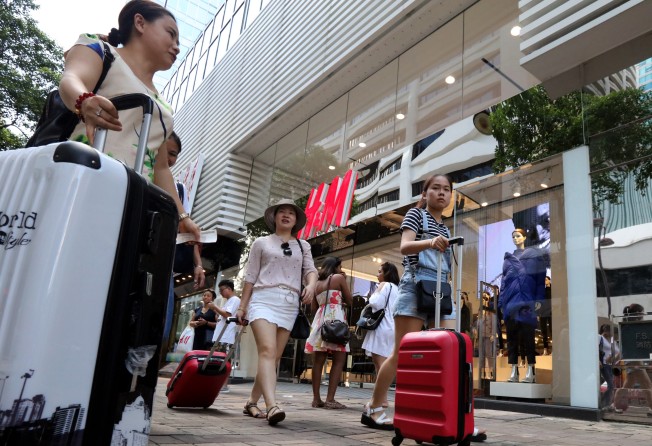The jury is still out on the prospects for Hong Kong’s retail reinvention
Structurally the industry remains reliant on visitors from mainland China, making it vulnerable to shifts in travel patterns

Just over a year ago, Hong Kong’s retail industry had just emerged from a period dogged by deteriorating sales caused by falling visitor arrivals, in particular those from mainland China who were responsible for the lion’s share of spending on luxury goods.
After the prolonged downturn, the city’s retail sales value increased during most of 2017, as an improved business atmosphere and a rebounding yuan currency encouraged mainland Chinese visitors to come back to Hong Kong.
But this recovery should not obscure the fact that the heyday of Hong Kong retail is unlikely to return. Changes in mainland Chinese visitors’ spending patterns from high-end to mid-priced products mean that the Hong Kong retail industry is no longer able to rely on luxury sales.
Meanwhile, hobbled by an inflexible exchange rate regime, the proliferation of online shopping and intense competition from neighbouring economies, Hong Kong’s retail industry has had to devise innovative ways, such as experience-based retailing, to stay in the game.
Nowhere is experience-based consumption more evident than in the food and beverage (F&B) sector, which has become an increasingly important part of Hong Kong tourism.
With the popularity of online shopping, Hong Kong’s conventional competitive advantage in attracting mainland Chinese shoppers has been diminishing in recent years. However, local experiences and the cultural elements of a city cannot be enjoyed online, and Hong Kong has a wealth of unique heritage and cultural traditions that other Chinese cities cannot offer. Its local food scene is one of them.
Riding on this legacy, F&B has emerged as one of the key attractions to visitors to Hong Kong. This is supported by the changing travel patterns of mainland Chinese visitors, switching from overnight to same-day, in-town visits. Even with a shorter average length of stay, meals outside hotels accounted for 12.3 per cent of total expenditure by mainland Chinese overnight visitors in 2016, up 2.9 per cent from 2013. For same-day visitors, the increase was from 2.8 per cent to 4.8 per cent during the same period.
Restaurant receipt figures reveal an even more telling story. In 2008, visitor spending on meals outside hotels accounted for less than 16 per cent of total restaurant receipts, but in 2016, this increased to over 25 per cent. In addition, Hong Kong abolished wine duty in February 2008. Considering there is no value-added tax or goods and services tax, Hong Kong is indeed the first ever tax-free wine trading and distribution hub among major cities, further strengthening the city’s F&B sector.
Meanwhile, Hong Kong’s cinema box office market has also grown strongly in recent years. Driven by increasing demand, box office receipts climbed almost 25 per cent, from HK$1.56 billion (US$199.4 million) in 2012 to HK$1.95 billion in 2016. The number of cinema seats however decreased by close to 10 per cent, resulting in a widening supply gap against rising demand.
Despite the proliferation of on-demand films, there is a steady crowd in Hong Kong who value the cinema experience. Meanwhile, for many consumers, activity-based entertainment forms an important part of their shopping experience. So there is plenty of room to explore in this market.
Perhaps time will tell if these developments will help Hong Kong’s retail industry lift itself out of the circle of decline. During the absence of mainland Chinese shoppers, mid-priced retail centred on daily necessities was driven by strong local consumption, thanks to Hong Kong’s strong economic fundamentals. But the industry is dealing with disruptive technologies that have transformed the dynamics between online and offline and between businesses and customers. However, the revolution in payment systems and distribution channels has not been as prolific in Hong Kong as in mainland China.
Structurally Hong Kong retailers and the retail property market continue to rely on mainland Chinese visitors, but whether the recovery in inbound tourism will continue is still in question, because of factors such as currency fluctuations and an increasing choice of other attractive travel destinations. The current recovery may also cause Hong Kong to become complacent, which would not only slow down the reinvention process but also subject the city to the next shock, whether it comes from changes to the visitor scheme or geopolitical disputes.
But the key players in the Hong Kong retail industry do not have to look far for examples of successful retooling for the long term. The success of some mega shopping malls in the UK amid the widespread app shopping culture is a good example.
David Ji is director and head of research and consultancy for Greater China at Knight Frank